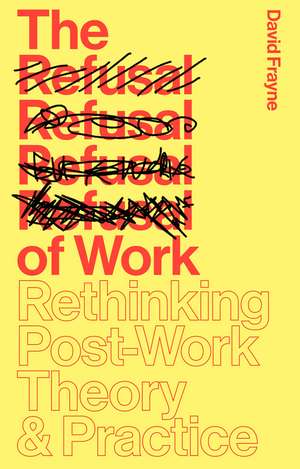The Refusal of Work: Rethinking Post-Work Theory and Practice
Autor David Frayneen Limba Engleză Paperback – 14 dec 2015
Modern capitalist society runs on paid work. Yet for many of us, paid work is at best a frustrating experience. Some of us are burdened with too much work, while others fight the hard realities of precarious, low-paid, low-quality work amid persistent mass unemployment. So what if we rethought the whole system?
That’s the ambitious challenge David Frayne takes up in The Refusal of Work. Drawing on substantial empirical research into the lives of people who are actively resisting employment—either by reducing their work hours to the minimum or by giving up work altogether—Frayne delves into the reasons that people disconnect from work, the strategies they develop for coping with not working in a society that demands work, and, perhaps most interestingly, what they do with their free time. The resulting book offers a fascinating portrait of an alternative approach to life under capitalism, and a bracing reminder that a humane and sustainable vision of social progress is possible.
That’s the ambitious challenge David Frayne takes up in The Refusal of Work. Drawing on substantial empirical research into the lives of people who are actively resisting employment—either by reducing their work hours to the minimum or by giving up work altogether—Frayne delves into the reasons that people disconnect from work, the strategies they develop for coping with not working in a society that demands work, and, perhaps most interestingly, what they do with their free time. The resulting book offers a fascinating portrait of an alternative approach to life under capitalism, and a bracing reminder that a humane and sustainable vision of social progress is possible.
Preț: 132.04 lei
Preț vechi: 156.38 lei
-16% Nou
Puncte Express: 198
Preț estimativ în valută:
25.28€ • 26.33$ • 20.98£
25.28€ • 26.33$ • 20.98£
Carte indisponibilă temporar
Doresc să fiu notificat când acest titlu va fi disponibil:
Se trimite...
Preluare comenzi: 021 569.72.76
Specificații
ISBN-13: 9781783601172
ISBN-10: 1783601175
Pagini: 224
Dimensiuni: 127 x 229 x 23 mm
Greutate: 0.36 kg
Editura: ZED BOOKS
Colecția Zed Books
Locul publicării:London, United Kingdom
ISBN-10: 1783601175
Pagini: 224
Dimensiuni: 127 x 229 x 23 mm
Greutate: 0.36 kg
Editura: ZED BOOKS
Colecția Zed Books
Locul publicării:London, United Kingdom
Notă biografică
David Frayne works as a part-time lecturer in sociology at Cardiff University and as a freelance research associate for Public Health Wales.
Cuprins
Introduction: The work dogma
1.A Provocation
2. Working Pains
3. The Colonising Power of Work
4. The Stronghold of Work
5. The Breaking Point
6. Alternative Pleasures
7. Half a Person
8. From Escapism to Autonomy
Bibliography
1.A Provocation
2. Working Pains
3. The Colonising Power of Work
4. The Stronghold of Work
5. The Breaking Point
6. Alternative Pleasures
7. Half a Person
8. From Escapism to Autonomy
Bibliography
Recenzii
“This is the start of a conversation. . . . A liberating and a worthy provocation.”
“Frayne scrutinises the emergence of a working culture that sees some condemned to work harder than ever while others must cope with unemployment or underemployment. By exploring the motivations of those who resist the nine-to-five, Frayne explores the world of work that props up present-day capitalism.”
“I found Frayne’s The Refusal of Work a fascinating book. Coming from a position of little exposure in these theories, it gave me a very concise run down of philosophical ideas and accounts around work, and the possibility for resistance and change. Again, it also opened up many more areas for further reading and research around these ideas. What I enjoyed most was Frayne’s main thrust and provocation in this text, the notion of freedom and, not just the possibility of, but the elevation and championing of leisure time.”
“The Refusal to Work documents a century’s worth of thought on work. The majority of the thinkers and theorists he covers predicated a radically different future.”
“Where other writers elaborate the scourge of neoliberalism—surely an important and pressing topic—they are less clear about how we, as individuals and political movements, might begin to build alternatives. Addressing this lacuna, Frayne’s approach is a refreshing addition to the conversation.?”
